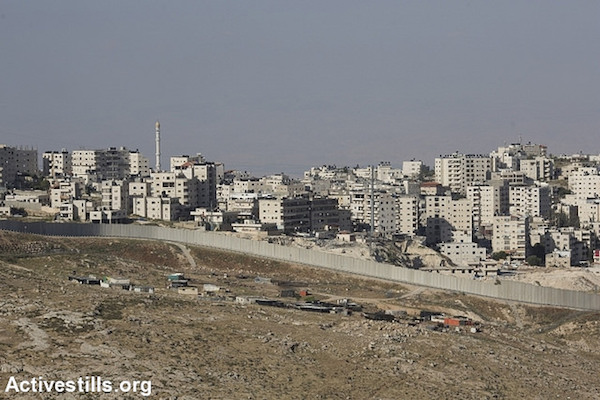The prime minister’s proposal to revoke the residency status of 100,000 East Jerusalemites sends an unequivocal message to all Arabs living under Israeli rule: your rights are rooted in our good will alone, and conditionally so. The silence of Israel’s ‘democratic’ camp is deafening.
By Yehudit Oppenheimer

Israel’s self-ordained “democratic” camp silently accepted Benjamin Netanyahu’s proposal to revoke the permanent residency status of 100,000 Palestinians who live in those East Jerusalem neighborhoods that lie beyond the separation barrier last month.
Even if Netanyahu’s proposal is never actualized, it is impossible to ignore its significance even as a proposal: the prime minister of Israel is advocating the mass transfer of Palestinians from Jerusalem and the center-left political parties in the opposition did not offer up even the faintest whisper of protest.
One might conclude that Netanyahu expressed in more explicit terms an idea that the center-left shares, but which it generally couches in more palatable language.
Thus, while Netanyahu may have rid himself of the two-state solution, the center-left continues to brandish it, albeit empty of all substance. Both major center-left political camps in Israel share their refusal to compromise on Jerusalem. Both the Zionist Camp (Labor and Tzipi Livni) and Yesh Atid (Yair Lapid’s party) toy with the idea that Palestinian Jerusalem can be pushed into remote city suburbs — the neighborhoods beyond the separation barrier.

But these poverty-stricken suburbs are not part of historical Palestinian Jerusalem in the same measure that they are not part of historical Jewish Jerusalem. No sane Palestinian leader would support such a proposal.
Both approaches share the same refusal to recognize any Palestinian attachment to historic Jerusalem, along with a denial of Palestinian attachment to greater Jerusalem. That is in addition to their attempts to portray of the current wave of violence in Jerusalem as localized and devoid of political context.
The complicit silence in response to Netanyahu’s transfer plan is one more sign that Israel’s “democratic” camp knows its own solutions are just as delusional.
In the absence of a political solution, Jews and Arabs in Jerusalem will continue living in a binational expanse, and there is only one democratic way to manage it — with full political and civil equality. However, both the right-wing and the so-called democratic camps are historically inclined to reject such a possibility.
From the mid-1990s, thousands of Palestinians from Jerusalem had their permanent residency status revoked under rightist and center-left governments
A decade later, under the cover of the Second Intifada, Israel built a separation barrier that cut off eight East Jerusalem neighborhoods from the rest of the city, deliberately transforming them into poverty-stricken ghettos whose residents live under constant fear of losing their residency status and being completely disconnected from the city — both geographically and politically.
From its inception, permanent residency status has always been a threat looming over East Jerusalem residents — long before Netanyahu’s latest plans were announced.
The silence of Israel’s “democratic” camp is even more serious since it radiates outward into Arab-Jewish relations inside Israel proper. A single line of thought runs between attempts to revoke residency status in East Jerusalem and Netanyahu’s attacks on Arabs within the Green Line, from blaming the Mufti for the Holocaust to portraying Arab voters as a threat. The groups’ residency status and citizenship might be different, but the message is uniform: your rights are rooted in our good will alone, and conditionally so. Or, in other words: in our eyes you are all East Jerusalemites.
Netanyahu’s proposal and the silent assent with which it was met constitute a watershed in Israeli-Palestinian relations in Jerusalem, and beyond. Both populations share and will continue to share common expanses, means of transportation, public and private services, and commerce.
Instead of declaring war on one-third of the city’s population, dialogue and fairness should be promoted. There are things that can and need to be done right now: an absolute defense of East Jerusalemites’ permanent residency status, the equal allocation of resources and infrastructure (especially in the neighborhoods beyond the separation barrier), the persistent struggle against racism and incitement, supporting Palestinian institutions in Jerusalem and advancing efforts to reach a political solution, or alternatively, agreed-upon arrangements based on equality and democratic values.
Yehudit Oppenheimer is the managing director of the Ir Amim NGO. This article was first published in Hebrew on Haokets. It was translated from Hebrew by Alan Horowitz.


